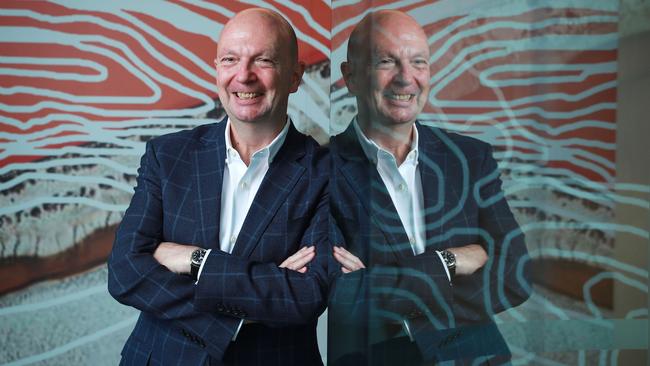State of Origin is just fine as Gordon Cairns departs
Gordon Cairns holds few regrets. But when he signs off as Origin Energy chairman after 13 years on the board, a languishing share price still rankles.

Gordon Cairns holds few regrets. But when he signs off on Tuesday as Origin Energy chairman after 13 years on the board, a languishing share price still rankles.
“We always have disappointments,” Cairns tells The Australian. “And the thing that disappoints me most is the share price. There’s no point in ducking it. We can objectify this and say it’s a function of where oil is at $40 — because we look back at our share price and it almost follows the oil price to a tee — and then you have the pandemic which hit demand and to some extent peoples’ views on regulatory policy.
“But I look back on the share price and think that’s the one disappointment.”
The numbers are stark. Origin was trading at $6.75 when Cairns signed on as a director in 2007 before a scramble to secure Queensland gas saw Origin handed a golden opportunity.
The 70-year Scot, also a director of Macquarie and chairman of retail giant Woolworths, had a front-row seat when Britain’s BG Group swooped in August 2008 with a $15.50-a-share bid valuing Origin at nearly $14bn. Amid the global financial crisis, Origin took the brave step of rejecting the takeover offer on valuation grounds.
But Cairns says it was a close-run decision.
“We were pretty close to accepting the offer,” Cairns recalls. “It was very compelling and we thought it was a good valuation. But things change and the board was united in doing the right thing by shareholders.”
Origin pursued an alternative path that saw it team up with US oil producer ConocoPhillips in a near $10bn deal, sowing the seeds for the Australia Pacific LNG project in Queensland.
Gas fever pushed Origin’s share price to $19.99 in September 2008. Twelve years on, the stock closed at $4.54 on Friday.
Still, Cairns says he’s lost little sleep over the decisions made by Origin’s board back in those fateful days during the global financial crisis.
“There’s no point in me explaining or apologising to shareholders. We took the decision and it was the right decision at the time,’ Cairns says.
“I don’t spend a lot of time looking back. One of the things I’ve learned is you can’t change the past and you can’t predict the future. So the only thing is the now and the present. So that’s where I tend to focus my attention.”
The decision to reject BG’s bid and instead team up with Conoco and later China’s Sinopec on the giant APLNG gas export project also had its doubters. Origin struggled for years under a hefty debt pile needed to fund its share of the APLNG plant and by 2015 it faced serious pressure.
Its share price had more than halved in three months, while an unexpected $2.5bn equity raising in 2015 surprised investors and even led to questions over whether then chief executive Grant King should resign. The sale of Origin’s stake in Contact Energy brought heckles from some investors while giant gas writedowns also weighed on sentiment over the fortunes of APLNG.
But Cairns says APLNG was always going to require shareholder patience and points to the cash now pouring out from the project, with Origin receiving a $1.275bn payout from the plant this year.
“We invested a tonne of money and for five years we got no cash back. For many years this was described as the ugly duckling and all of a sudden the ugly duckling started to generate over $1bn of cash. And all of a sudden the ugly duckling has become the beautiful swan.”
The big bet on Queensland gas was in large part due to the vision of King, who spent 16 years as Origin boss and deserves credit for his foresight, according to Cairns.
“Shareholders say you should invest for the long-term because we fundamentally believed in gas as a transition fuel and this was the strategy led by Grant, who was remarkably prescient and strategic. He recognised China in particular would have to decarbonise and gas will be important for China.”
APLNG was a rocky road but adding a new earnings stream separate to its electricity retail business, hit by low prices and government intervention in the last few years, has given Origin a notable point of difference to rival AGL Energy.
The final part of King’s reign was marred by questions over Origin’s performance and strategy with a subsequent investor backlash even forcing him to step down from the BHP board in 2017 as the global miner faced a move by activist investor Elliott. It remains a sensitive issue.
“I felt sorry for Grant during that BHP process. He got unduly vilified and if BHP hadn’t been going through the issue with the activist shareholder on the register, they might have been prepared to take the fight on,” Cairns reflects.
“Grant, to his eternal credit — and this is a measure of the man — he said to me, look the last thing they want is for another bushfire when they have this activist and they need to focus on that.”
Origin continues to profit from King’s strategy, his chairman says.
“His vindication is you’re earning more than $1bn from APLNG, you’ve got a great retail consumer business and a great leadership team. That’s the best legacy you could leave. I hope people speak as fondly of me,” laughs Cairns.
Cairns also stands behind Eraring, another notable deal struck just before he took up the Origin chairman role in October 2013. It handed Origin control of Australia’s largest coal power plant, again proving a cash cow in recent years amid high wholesale prices.
But it’s also put Origin in the firing line among environmental-focused investors who question how its 2032 closure date aligns with the Paris climate accord. Cairns defends his green credentials, noting he stood up and argued for a carbon tax while Origin also backed Josh Frydenberg’s National Energy Guarantee, axed after pressure from the Morrison government’s conservative faction.
“Eraring was the right decision at the time and we’ve also announced the right decision which is when we’re going to close it. Unfortunately as I’ve been trying to explain to some of these pressure groups, you can’t just argue for decarbonisation. You’ve got to also argue for affordability and availability. Given we have to manage against all three, I personally think the discussion is going in exactly the right way.”
While Cairns has been typecast as combative in the past — leading Lion Nathan, Arnott’s and PepsiCo with an ‘‘iron fist’’ — he now treads a more diplomatic path after a 2020 that has required companies and boards to think on their feet. He puts some of that down to his embrace of Buddhism and meditation.
But he also recognises the role of Origin as Australia’s largest electricity retailer and Woolworths as the nation’s biggest supermarket chain requires more of a deft touch, with both in the COVID-19 front line.
“I think the way both federal and state governments have handled this has been exemplary. I’ve got family in the UK and it’s a nightmare. I’ve got colleagues on the Woolies board who are in the US and it’s a nightmare. Here in Australia we are arguing about whether we should open up borders. That’s a nice discussion to have where we can actually contemplate it.”
Cairns says his own legacy will be for others to judge. At Origin he picks out the change in culture and customer service as the most profound change during his tenure as chairman. “There’s a lot of things I screwed up. But in my reflective moments I say getting the right CEO and getting the right culture. I’ll accept all the criticism but I’ll leave on Tuesday knowing from a cultural and leadership point of view, the business is in great shape.”
More Coverage
Read related topics:Origin Energy







